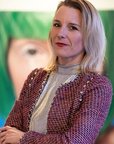Australian artist and management thought leader Ralph Kerle gives a Creative Leadership Workshop at the Berlin School of Popular Arts.

The Australian management trainer and multimedia artist Dr Ralph Kerle, who is one of the 100 Global Creative Leaders in the world according to IBM, led a workshop on creative leadership at SRH Berlin. The B.A. Creative Industries Management students approached a range of business questions and strategy challenges through the medium of clay in order to develop a creative workflow. Creativity, breaking through thought patterns and structures was required.
Developing a creative workflow for value creation and growth
Kerle calls his workshop "Developing Creative Flow to Create Growth and Value". He briefly explained the importance of creativity and innovation in companies and a well-known problem: Although every company has the potential for creativity, a 'creative gap' is often created by wrong management. Kerle refers to such companies as 'business as usual' companies. The main problem here is the tension between employer and employee, which creates a blockade that makes creative work impossible. And this is exactly where Kerle comes in. He brings the creative flow back into the company. But how do you get from "business as usual" back to creativity? With a piece of clay.
Developing non-verbal communication
Divided into groups, the students were required to work fast and in an impulsive manner. Each student had to shape the clay into any form within a few seconds. The second task was to continue shaping the clay and then position it on the table one by one. The task allowed the groups to form as a team by adjusting their own shape and interacting with others. Then, one person had to place their sculpture in the middle of the table and the others followed within seconds. Due to the short period of time and without talking to each other, the students learned how to interact with each other spontaneously in situations. One of the last tasks for the students was to form something together with their respective groups, but without words. The whole thing worked without any problems by observing the other group members, adjusting their own form. Looking at the entire the group work later, it became clear how effective non-verbal communication can be.
The results changed at every step. The students became quicker in their reactions and internalised the concept of always adapting to the other team members. Everyone realised that speaking is not the only way to communicate. Sometimes it is better to observe silently first and only then interact with the others.
The Case
Kerle's final task was "The Great Berlin Laptop Competition". The students were to shape the laptop of the future out of clay. After a bit of brainstorming, all groups set to work shaping their prototypes of the laptop of the future. The results were then presented. There were cube laptops that you could carry around in your pocket or rings that could be individually designed, with which you could write and make phone calls. All the students were now asked to choose the one they liked best. Afterwards, the two copies with the most votes were discussed. In the end, it turned out that although both looked completely different, their main features were the same. Such as: mobility, lightness, multifunctionality and much more.
Conclusion
Kerle explained that every organisation is systematically and uniquely creative, however, sometimes the creative workflow is missing. That is why workshops like that by Ralph Kerle are so important. They strengthen and consolidate spontaneous, creative thinking and teamwork. Participants develop new thinking patterns and strategies to better deal with future challenges.
An interesting aspect of the workshop was that individual work in the group and the communication within the group led to an overall result. In the end, all students got into a creative flow of work and the whole thing was not only efficient, but everyone also visibly had fun. Moreover, the students were fascinated by the results of the workshop: "We worked together without words and mastered integrating all the ideas of the individuals and creating something new from them."
Students of the B.A. Creative Industries Management


